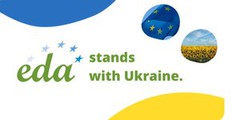Time to be united to support Ukraine and the Single Market, - EDA

EDA has conveyed its discontent over the fact that several Member States have, unilaterally, implemented trade restricting measures on the import of Ukrainian agri-food products, including dairy products, to the European Commission.
"As EDA, we have clearly stated our support for the continuation of the European Commission's zero quota, zero tariff approach when it comes to Ukrainian dairy exports to the EU. These exceptional times ask for unity rather than solo flying Member States putting the internal market at risk. Today we cannot see a market impact that would justify any restrictions on the import of Ukrainian dairy imports, and we therefore called upon the European Commission to defend the integrity of the Single Market and to uphold the special suspension for all tariffs and quotas.
Our special EU-Ukrainian dairy relationship was recently underlined with the attendance of the CEO of the Ukrainian Dairy Federation at our latest EDA Dairy Policy Conference in March 2023" the statement says.
As noted earlier, the Polish milk associations "Agreement for Dairy" appealed to the Minister of Poland Buda for a reaction on dairy products.
In the letter addressed to Waldemar Budy, Minister of Development and Technology, and signed by Grzegorz Gańko, Chairman of the Agreement for Dairy, is stated:"– The Polish dairy sector is watching with concern the deteriorating situation of Polish farmers and milk processors, which results, among others, from Russia's aggression against Ukraine. The war, which has been going on for over a year, has significantly destabilized the situation in the European agri-food sector. The dairy sector is one of the hardest hit by this crisis. The situation we are facing today is unprecedented and results in huge problems resulting from falling prices of both raw materials and finished products, while increasing the costs of production, packaging, storage and transport.
– With the reduced demand for dairy products resulting, among others, due to inflation, Polish milk producers and processors must now rely more than ever on exports of dairy products. One of the significant countries in the trade of dairy products is Ukraine.
For 5 years we have been the largest supplier of cheese, milk, milk drinks and modified whey to Ukraine. Ukraine is one of the largest non-EU recipients of our dairy products (EUR 108 million in 2022) and it accounted for over 3% of all our exports.
Ukraine has a 17% share in the export of Polish yoghurt, 7% in the export of processed cheese and 9% of rennet cheese.
Therefore, we were concerned about the regulation signed by you on April 15 this year on the ban on imports of agricultural products from Ukraine. According to the annex to the regulation, the ban also applies to milk and milk products.
– As representatives of the dairy industry, we believe that the current results of foreign trade in dairy products between Poland and Ukraine do not justify the introduction of such drastic measures as the ban on the import of milk and milk products to our country. At the same time, we are afraid that the Ukrainian side may take retaliatory measures in trade with Poland, which will result in a halt or ban on exports, mainly of our cheeses, whey powder and fermented products, for which Ukraine is an important market today. We would like to remind you that before the start of hostilities in the territory of our eastern neighbour, the Ukrainian side sought to limit the export of cheese from Poland to Ukraine, accusing the Polish side of using dumping prices.
– Considering the above, we request that milk and dairy products be deleted from the annex to the Regulation of the Minister of Development and Technology of April 15, 2023 on the ban on imports of agricultural products from Ukraine".
IC UAC according to the EDA
- 581 reads







